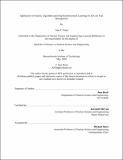| dc.contributor.advisor | Koroush Shirvan. | en_US |
| dc.contributor.author | Reed, Jane C.,S.B.Massachusetts Institute of Technology. | en_US |
| dc.contributor.other | Massachusetts Institute of Technology. Department of Nuclear Science and Engineering. | en_US |
| dc.date.accessioned | 2020-09-15T21:51:27Z | |
| dc.date.available | 2020-09-15T21:51:27Z | |
| dc.date.copyright | 2020 | en_US |
| dc.date.issued | 2020 | en_US |
| dc.identifier.uri | https://hdl.handle.net/1721.1/127308 | |
| dc.description | Thesis: S.B., Massachusetts Institute of Technology, Department of Nuclear Science and Engineering, May, 2020 | en_US |
| dc.description | Cataloged from the official PDF of thesis. | en_US |
| dc.description | Includes bibliographical references (page 21). | en_US |
| dc.description.abstract | The nuclear reactor core is composed of few hundred assemblies. The loading of these assemblies is done with the goal of reducing its overall cost while maintaining safety limits. Typically, the core designers choose a unique position and fuel enrichment for each assembly through use of expert judgement. In this thesis, alternatives to the current core reload design process are explored. Genetic algorithm and deep Q-learning are applied in an attempt to reduce core design time and improve the final core layout. The reference core represents a 4-loop pressurized water reactor where fixed number of fuel enrichments and burnable poison distributions are assumed. The algorithms automatically shuffles the assembly positions to find the optimum loading pattern. It is determined that both algorithms are able to successfully start with a poorly performing core loading pattern and discover a well performing one, by the metrics of boron concentration, cycle exposure, enthalpy-rise factor, and pin power peaking. This shows potential for further applications of these algorithms for core design with a more expanded search space. | en_US |
| dc.description.statementofresponsibility | by Jane C. Reed. | en_US |
| dc.format.extent | 21 pages | en_US |
| dc.language.iso | eng | en_US |
| dc.publisher | Massachusetts Institute of Technology | en_US |
| dc.rights | MIT theses may be protected by copyright. Please reuse MIT thesis content according to the MIT Libraries Permissions Policy, which is available through the URL provided. | en_US |
| dc.rights.uri | http://dspace.mit.edu/handle/1721.1/7582 | en_US |
| dc.subject | Nuclear Science and Engineering. | en_US |
| dc.title | Application of genetic algorithm and deep reinforcement learning for in-core fuel management | en_US |
| dc.type | Thesis | en_US |
| dc.description.degree | S.B. | en_US |
| dc.contributor.department | Massachusetts Institute of Technology. Department of Nuclear Science and Engineering | en_US |
| dc.identifier.oclc | 1191904175 | en_US |
| dc.description.collection | S.B. Massachusetts Institute of Technology, Department of Nuclear Science and Engineering | en_US |
| dspace.imported | 2020-09-15T21:51:27Z | en_US |
| mit.thesis.degree | Bachelor | en_US |
| mit.thesis.department | NucEng | en_US |
